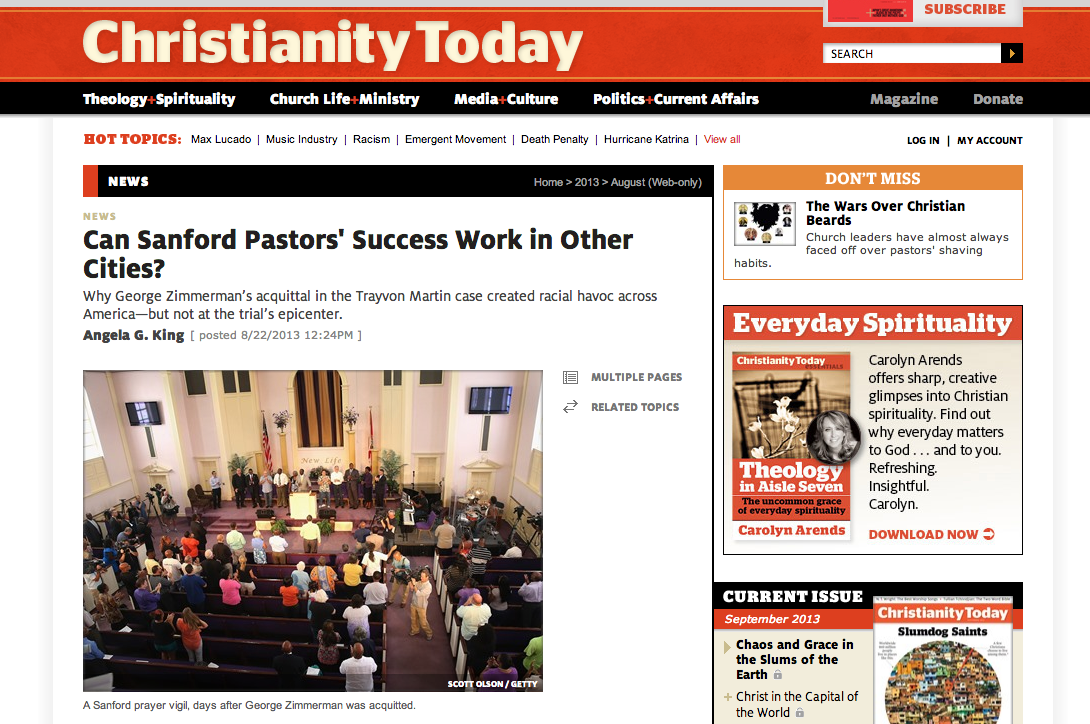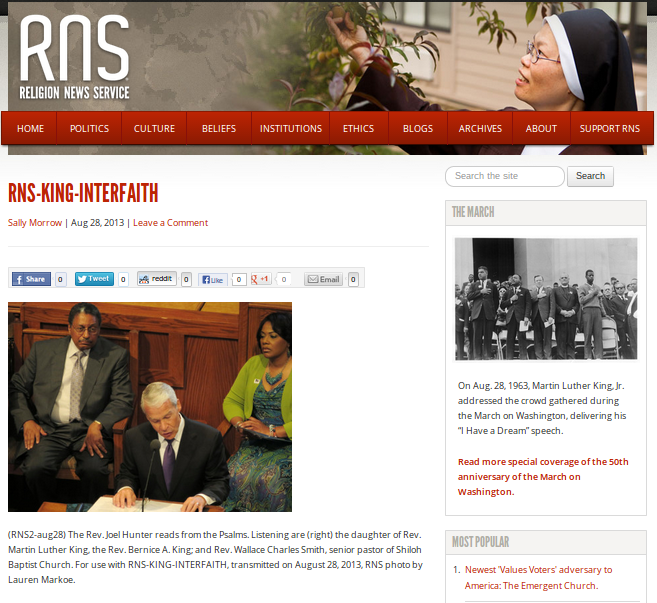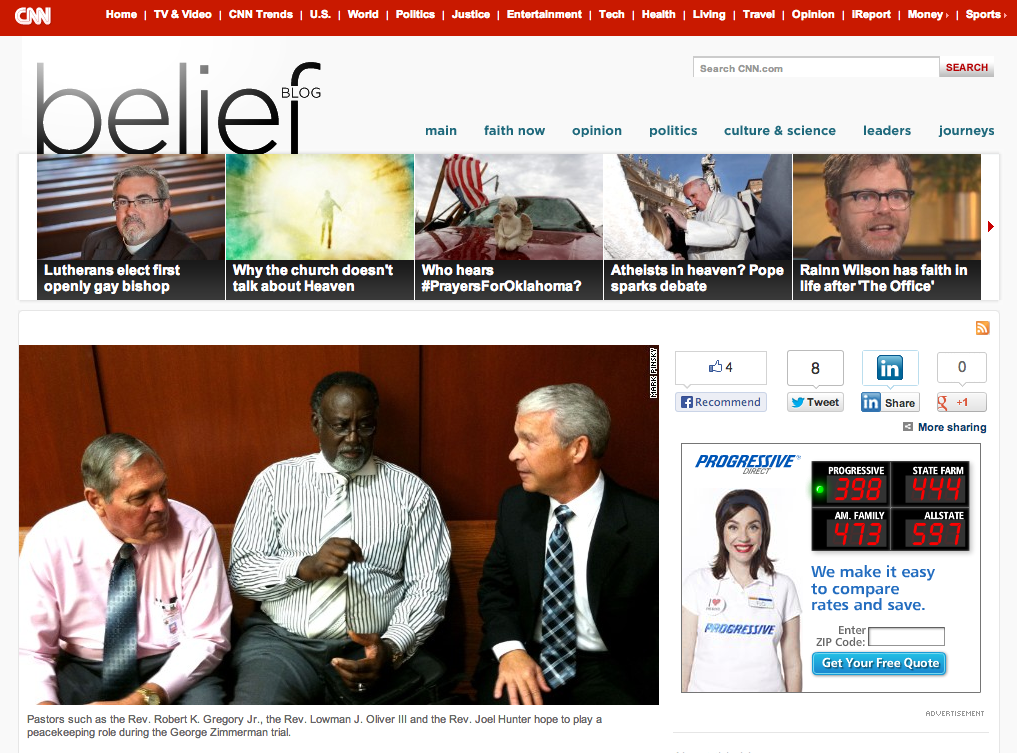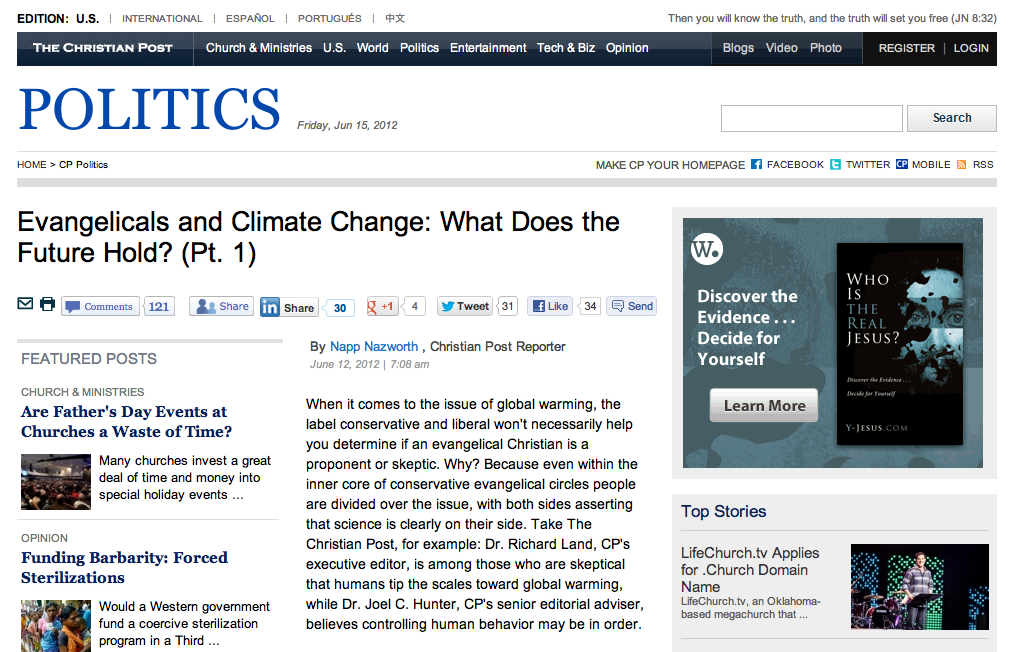 A diverse group of 40 pastors gathered in a Detroit hotel today to hear a remarkable tale: how the pastors of Sanford, Florida, spared their city from the racially charged protests that erupted nationwide last month after a jury acquitted George Zimmerman of murdering Trayvon Martin.
A diverse group of 40 pastors gathered in a Detroit hotel today to hear a remarkable tale: how the pastors of Sanford, Florida, spared their city from the racially charged protests that erupted nationwide last month after a jury acquitted George Zimmerman of murdering Trayvon Martin.
Sanford could have understandably been the epicenter of outrage over the controversial July verdict, which inspired significant protests—some marred by vandalism and violence—from New York to Los Angeles. Instead, this commuter suburb of Orlando weathered the aftermath so successfully that its pastors are now on a mission to spread the progress they've made toward calm and reconciliation to urban centers nationwide.
Already on the list after Detroit: Toledo, Charlotte, New York, Denver, and Minneapolis.
"The timing is absolutely right for this. There is no question about it," said Derrick Gay, pastor of Sanford's Dominion International Church and an organizer of the tour. "We as the church have been given, according to 2 Corinthians 5, the ministry of reconciliation. There's no other institution on earth that has been given this authority—not the government, not the banks, not the education system that we have."
The collaboration, in which pastors across racial, ethnic, and denominational lines meet to eat, pray, and candidly air racial concerns, is even more notable in a city with the historical distinction of being where Jackie Robinson was ousted from minor-league baseball training in 1946.
Leading the charge is Sanford Pastors Connecting (SPC), the interracial, cross-denominational group first organized by the United States Department of Justice (DOJ) to help the city of Sanford navigate fallout from the shooting death of unarmed, 17-year-old Martin there in February 2012.
The Department of Justice sent veteran mediator Thomas Battles to Sanford to help keep the peace after Martin's death. He, in turn, organized pastors to form SPC. The pastors were given four reserved seats daily in the local courtroom during Zimmerman's trial. The pastors rotated through to witness the proceedings firsthand and to relay what was going on to courthouse crowds and to their own congregations.
SPC pastors agreed to support the jury's verdict, whatever it was, and keep the peace afterward. When the jury acquitted Zimmerman of second-degree murder and manslaughter charges, it seemed it might be a problematic promise to keep.
But solidarity and prayers played a big part in diffusing any violence that might have broken out in Sanford, either during the initial unrest over Martin's death or when Zimmerman was ultimately acquitted, said Joel Hunter, a SPC member perhaps best known as one of President Barack Obama's spiritual advisors.
"We had already built up a very solid core of people who were committed to not just reacting to a verdict, but sifting through how we could improve the community because of this," said Hunter. His congregation, Northland: A Church Distributed, near Sanford is predominantly white, and is the largest evangelical church in central Florida.
Hunter said that sitting together through the somber, racially charged Zimmerman trial ironically helped to bridge some of the long-entrenched disconnect between Sanford's black and white clergy.
Positioned side by side, chatting before and after court proceedings, and having lunch together during breaks "has built a much closer relationship between many of the African-American pastors and Anglo pastors," said Hunter. "You can say talk is cheap. But when you go through something like this and you have an ongoing dialogue, the closeness of relationships that happens is really remarkable."
Despite their different races, genders, and religious backgrounds, 30 to 40 clergy have continued to meet monthly for breakfast at Sanford's Cracker Barrel restaurant since the start of the trial. That's no small feat, given that getting any group of pastors to work together can be "like herding cats," said Jeffrey Krall. The Assemblies of God pastor chairs SPC alongside pastor Valarie Houston, whose Allen Chapel AME Church is regarded as "Ground Zero" for the public outcry over Martin's death.
Krall, lead pastor of Sanford's mostly white Family Worship Center, said the seeds for this momentum were actually sown 22 years ago.
"It's always been racially divided down here," said Krall of his city's 55,000 residents. (Today, 30 percent are African American, 20 percent are Hispanic, 3 percent are Asian, and the rest are white.) In response, he launched the Sanford Ministers Fellowship in 1991. Though the group has been working to cultivate reconciliation in Sanford a lot longer—and is just as steadfast in praying and interceding toward that end—Krall conceded the fellowship never became as large, high-profile, or diverse as SPC has become over the past year.
"I actually feel like Thomas Battles used his leverage to accomplish what I have been trying to do for more than 20 years," Krall said of the DOJ regional director, who is African American. "I'm rejoicing that he got involved. There's just a great humility and fear of God on everybody."
"That doesn't mean that the issues have all gone away. We have a lot of work cut out for us," said Charles Holt, rector of St. Peter's Episcopal Church and School in neighboring Lake Mary. "But what's changed in Sanford is the communication taking place [between] various churches across the spectrum, and between the church and the community. That's a huge step in the right direction."
Another local Christian leader who has been very ambitious in mobilizing pastors to seek racial reconciliation is Steve Strang, founder and CEO of Charisma Media. From his headquarters in Lake Mary, a city barely more than 2 miles from where Martin died last year, Strang has rallied Sanford-area pastors to hold special prayer meetings and forums in the wake of the shooting.
Last year, his company produced Sanford: The Untold Story, a documentary of Sanford-area church leaders speaking out on race relations. In July, Strang brought together 30 faith leaders from around the country to publicly issue a covenant of racial reconciliation. Called The Sanford Declaration, the July 31 announcement at Charisma Media served as a prelude to the National Reconciliation and Relationship Initiative now being mapped out.
"We invited some pastors from different cities that actually came on their own dime to see what's happening in Sanford," said Gay, who is African American. Attendees included Promise Keepers president Raleigh Washington and such megachurch leaders as Touré Roberts of One Church International in Los Angeles, Dale Bronner of Word of Faith Family Worship Cathedral in greater Atlanta, and Harry Jackson of Hope Christian Church in suburban Washington, D.C. The plan is now for Sanford pastors to visit these urban centers with their message. The first stop: Gay keynoted Promise Keepers' Reviving Detroit Summit today at the struggling city's iconic Hotel St. Regis.
A former star football player at Florida A&M University, Gay has become key among Sanford ministers in pushing for racial reconciliation. In November 2011, he moved his multicultural, nondenominational congregation to the Sanford area from Altamonte Springs.
"It was a tough decision because in the transition, we probably lost a third of our church," said Gay. "However ... as a 34-year-old, for the first time in ministry, I feel like I'm in the right place and God has ordered this thing. ... When everything began to jump off, I really felt strongly that this city needed someone who was not from this city, and could identify with the people there, particularly the young people."
Despite the enthusiasm SPC pastors have for their undertaking, some counter that there's still a long way to go to forge any kind of lasting, substantive advances in race relations in Sanford, let alone nationwide.
There are still "layers and layers of issues" that need to be addressed, said Bridget Watson. Involved with SPC when it first got off the ground but no longer, she and her husband lead Dunamis Community and Outreach Ministries, a small multiracial church near Sanford.
"I have a 17-year-old son and a 14-year-old son, both who are excellent students and very mannerly," said Watson. "We have to teach them to never appear in such a way as to [seem] threatening. I know my white friends don't have to worry about that."
Parris Baker is not a minister, but the charismatic Northland attendee was invited to work with SPC at its onset. However, the 25-year-old African American said he eventually cut ties with the group, frustrated by their steady calls for meetings about reconciliation, healing, and prayer.
"While I appreciated those efforts, they were inadequate," said Baker, a Sanford actor and rap artist who is studying to become a teacher. "As a young man, I am painfully aware of how young people, by and large, are unchurched. Conscious of how deeply I and other young people were affected by Trayvonʼs killing, I knew we needed to be reached, but it could not be accomplished through church or youth conferences."
But SPC wants to go beyond Cracker Barrel meals. After Zimmerman's acquittal, they started prayer meetings at the Sanford police station and issued a joint proclamation for peace. Next they hope to launch a Swap-A-Pulpit Sunday, a monthly youth worship service, and develop sports programs and other after-school activities so that Sanford youth and law enforcement can interact.
Meanwhile, other faith-based groups are also trying to unite the community. Examples include the Love Sanford Project, headed by community activist Paul Benjamin Sr., and a youth mentoring project for inner-city youth that Benjamin's Central Florida Dream Center is developing with St. Peter's.
Krall says he's finally witnessing the manifestation of a breakthrough he got wind of decades years ago. "I was on a fast when the Lord [revealed to] me that he wanted to do something very, very significant in the city of Sanford," he said. The experience led him to create the older Sanford fellowship. "People would actually fly into our little airport to see what God was doing here." He thinks the cooperation could offer a glimpse of heaven a la Revelation 7:9-10, with "a great multitude, which no man could number, of all nations and kindreds and people" praising Jesus.
Gay admits that visions differ a bit between members, just as they differ in other areas. "In all honesty, we may [still] be divided on what we feel justice should be in this situation," he said. "But we're not going to allow this thing to have a negative impact on this city.
"Our feelings were put on the back burner for the sake of this community," he said. "This is the way that we believe Christ would operate, and we've seen tremendous things happen. It is essential for us to now move forward."
By Angela G. King. SOURCE: http://www.christianitytoday.com/ct/2013/august-web-only/sanford-florida-pastors-reconciliation-trayvon-zimmerman.html?paging=off





